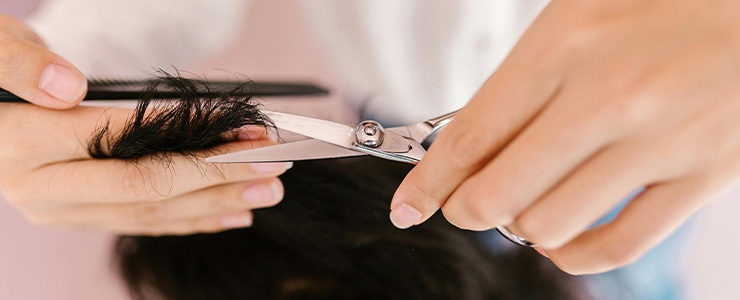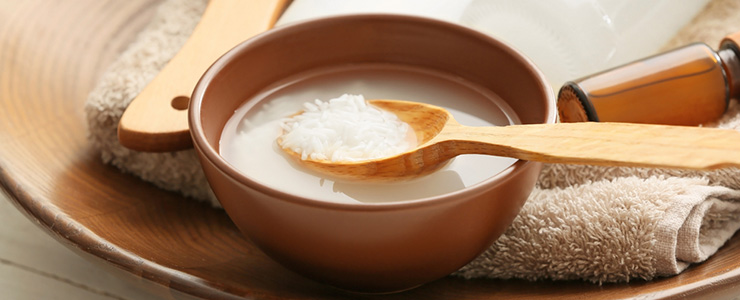Who doesn’t love long lustrous locks of hair? Hair that you can flaunt and try various trending hairstyles on. It is a physical attribute that makes one look confident and beautiful. In primitive days, thick and dense hair was also associated with prosperity and a comfortable lifestyle. Instead of growing it out without tending to your tresses, it is essential to understand the benefits of trimming hair.
Letting your hair grow without any care can do more harm than good, as it can ruin the quality of your hair. Therefore, it is necessary to timely trim your hair every now and then to keep it in good condition and maintain its style and quality.
It’s a myth to believe that regular trimming can help your hair grow faster because simply trimming does not stimulate hair growth. Getting a hair cut once in a while has nothing to do with the follicles of your hair which are ideally responsible for hair growth. However, a regular trim makes your hair look healthy and thicker as the limp and dead hair is chopped off.
-
Avoids split ends
-
Eliminates frizziness
-
Keeps hair knot-free
-
Prevent hair damage
-
Enhanced styling versatility
-
Prevention of hair damage and breakage
- Ensure not to comb your hair while it is still wet, as it can lead to breakage. However, excessive brushing can also cause hair damage.
- Cover your hair with a hat or scarf to protect it from exposure to the sun’s harmful ultraviolet rays, pollution, dust, and dirt.
- It’s recommended to get your hair trimmed once every 2-3 months and maintain that frequency.
- Avoid washing your hair every day, especially using hot water, as it can strip your hair of its natural oils, dehydrating and weakening it.
- Avoid vigorously rubbing your wet hair dry.
- Oil your hair before swimming. A protective layer of coconut oil can prevent the damage caused by chlorine-infused water.
-
Long-term hair health and maintenance
- A good oil massage can increase blood circulation to your scalp, providing essential nutrients and oxygen to hair follicles. Almond, coconut, or castor oil are some of the most recommended oils.
- Shampoo and condition your tresses to clean off the everyday dust and dirt. Ensure you handle your hair gently and not comb it harshly.
- Eating right is equally important to get long, thick hair. Include fruits, green leafy vegetables, and foods rich in protein, zinc and omega-3, such as nuts or salmon.
- Drinking plenty of water and staying hydrated is vital for skin and hair care.
- Sleep on satin pillowcases that reduce the friction between your head and the pillow. You can also use silk scrunchies, scarves, or headbands to protect your hair from breakage.
- Getting adequate sleep and indulging in de-stressing activities such as yoga, meditation, and daily exercise, can also positively impact hair growth.
-
Improved hair texture and appearance
When your hair becomes brittle and dry, the outermost layer of the hair fiber splinters, damaging a hair strand and causing it to split or fray. These dry, dead ends of hair are known as split ends, caused by extreme weather conditions, exposure to chemical products, excessively using heating techniques, or by rubbing your hair roughly with a towel. The strand of hair gives a forked appearance in the form of a Y-shape, and makes your hair look discoloured and uneven.
There are no treatments available for avoiding split ends. The benefit of trimming hair is the only way to prevent split ends and keep your hair well-nourished. Dry hair can weaken your hair, making it prone to split ends. Therefore, use hair masks, such as aloe vera, honey, and yogurt, among other options, to lock in the moisture for bouncier and shinier hair.
The daily wear and tear of hair can cause frizziness and damage. Avoid rubbing your hair dry when it is still wet as it can damage your hair cuticles, causing hair to become frizzy and resulting in hair breakage. Instead of rubbing it dry, gently blot it dry with a soft towel. Regularly comb your hair for a neat appearance, otherwise it would look flat, unkempt, rough, and dull.
Don’t go days without combing your hair, as it can lead to tangles or knots. But pulling or tugging on the knots with a comb is no solution either. It’s advisable to gently use your fingers to set the knots free and untangle your hair. Use a wide-toothed comb to brush your hair to prevent breakage. Resorting to serums or sprays to smoothen your hair out is often counterproductive as such products contain chemicals that can damage your hair cuticles and cortex.
Using frequent heating techniques, such as curling, straightening, blow-drying, can change the structure of your hair proteins, leading to hair damage. Refrain from chemical treatments such as perms or colouring to preserve your hair’s health.
Among the many benefits of cutting hair, one includes how cutting and maintaining your hair can make it easy to get a desired hairstyle. Once the unruly hair is out of the picture, you can try as many versatile hairstyles as possible, while also ensuring you don’t go overboard on using hair fixing sprays and other chemicals to keep the hairstyle in place.
If you want your hair to grow faster, dedicated hair care is the key. Other than advantages of trimming hair, some other solutions include:
Trimming your hair on a regular basis maintains its texture and length, and encourages your hair to grow in the right direction. Consistent hair care can also improve your hair’s texture and appearance.
Conclusion
Your hair care is in your hands. While hair type differs from person to person, you can always consult a dermatologist or a hairstylist to understand the cut that suits your face and the hair treatment that is most suitable for your hair’s health.
Skin and Hair Academy’s online portal, Find a Dermatologist, can connect you with expert dermatologists who specialise in addressing skin and hair issues. The platform supports a vast network of experienced healthcare professionals, who can ensure personalized care and guidance. Prioritise your health and make optimal use of this resource to access the expertise needed for your skin and hair condition.
Sources –
https://www.healthline.com/health/beauty-skin-care/how-often-should-you-cut-your-hair
https://www.healthline.com/health/how-to-prevent-split-ends
https://www.stylecraze.com/articles/importance-of-trimming-split-ends/














